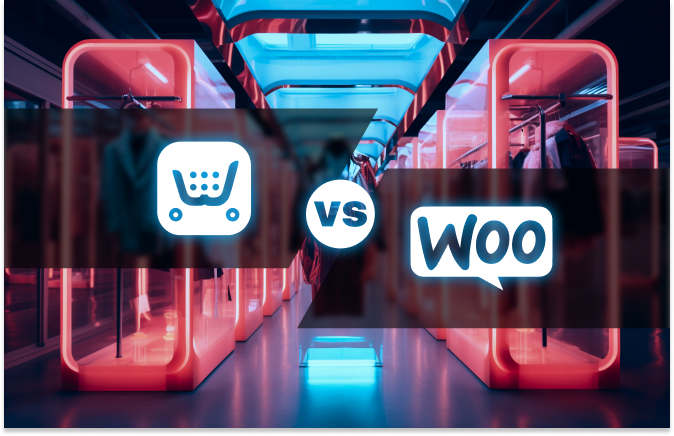Ecwid vs WooCommerce is a debate that has been on the mind for businesses looking to expand online. In this article, we will not only look at what each platform has to offer, but also an in-depth comparison based on the requirements that most business owners keep in consideration.
According to Forbes, the ecommerce market is set to reach $6.3 trillion in 2024. Furthermore, 23% of all sales will be conducted online by 2027. Naturally, this is encouraging businesses to move towards ecommerce. The problem arises when businesses are trying to pick a platform. Out of the market leaders, WooCommerce and Ecwid are the leading choices for businesses.
In this article we will discuss Ecwid vs WooCommerce, a quick comparison and an in-depth look in the factors that businesses look for when choosing between the two.
Ecwid vs WooCommerce: A Quick Comparison
Before we look into the factors that need to be kept in consideration let’s take a quick glance at all the features that the two platforms offer and how they differentiate from each other.
| Feature | WooCommerce | Ecwid |
| Platform | WordPress | Standalone (can be integrated with any site) |
| Ease of Use | Requires some technical knowledge | User-friendly and easy to set up |
| Cost | Free plugin, but requires hosting and additional extensions | Free plan available, paid plans for more features |
| Customisation | Highly customisable with plugins and themes | Limited customisation compared to WooCommerce |
| Payment Gateways | Supports numerous gateways through extensions | Supports a variety of gateways, built-in integration |
| SEO | Excellent SEO capabilities via WordPress | Good SEO features, but not as extensive as WooCommerce |
| Scalability | Highly scalable with the right hosting | Scalable, but may require upgrades to higher plans |
| Integration | Wide range of integrations with WordPress plugins | Integrates with many platforms, including WordPress, Wix, and more |
| Support | Community support, documentation, and paid support available | 24/7 support with paid plans, extensive knowledge base |
| Product Management | Advanced product management features | User-friendly product management, but fewer advanced features |
| Security | Depends on hosting and installed plugins | Secure hosting with SSL included in paid plans |
| Mobile Responsiveness | Mobile-friendly themes available | Fully responsive across all plans |
Ecwid vs WooCommerce: Detailed Comparison
While both WooCommerce and Ecwid have their strengths, the choice between them largely depends on your specific needs and technical capabilities. Following is a detailed comparison based on some of the major factors that are considered by business owners.
Pricing
The first and foremost factor considered is the pricing of any given platform. Businesses want to understand the investment that will go into acquiring a specific platform and forecasting the returns it will have for the business.
Let’s first look at WooCommerce. WooCommerce is a free plugin for WordPress, but you will need to pay for hosting, domain registration, and any additional plugins or themes you may need to enhance your store’s functionality. These costs can add up depending on the complexity of your site and the features you want to implement.
On the other hand, Ecwid offers a free plan with limited features, which is suitable for small stores. For more advanced features, you need to subscribe to one of their paid plans, which range from affordable to moderately expensive, depending on the size and needs of your business. Hosting and security are included in these plans, simplifying the cost structure.
When we talk about pricing, Ecwid is the preferred platform for pricing due to its straightforward and scalable pricing plans, especially for smaller or newer businesses.
Features
The next factor that is considered are the features that each platform offers. Features play a vital role when it comes to choosing a platform. Features can include payment gateways, shipping solutions and many more. Each of these platforms offer a specific set of features that can be beneficial for online businesses.
WooCommerce offers an extensive library of plugins and themes. It offers advanced product management, customisable checkout processes, and a wide range of payment gateways in the form of features. The flexibility allows for almost limitless customisation tailored to your specific needs.
Ecwid, on the other hand offers built-in payment gateways, automated tax calculations, and seamless integration with various website builders. However, its feature set is somewhat limited compared to WooCommerce, especially when it comes to advanced customisation and extensions.
In terms of features, WooCommerce takes the lead because of its extensive customisation options and flexibility. While Ecwid is not far behind, WooCommerce has the edge in this regard.
Interface and Ease of Use
Ease of use and interface plays a huge role in deciding which platform to choose. Whether you go for plugin integration like WooCommerce or a more plug-and-play process like Ecwid, this factor is important for most business owners as complexity can lead to the acquisition of new resources which is seen as additional costs.
As a WordPress plugin, WooCommerce requires some technical knowledge to set up and manage. While it offers great flexibility, this can come with a steeper learning curve for those not familiar with WordPress.
On the other hand, Ecwid is designed to be user-friendly and easy to set up, even for those with limited technical skills. Its intuitive interface allows you to get your store up and running quickly, and managing products and orders is straightforward. Ecwid wins in terms of interface and ease of use due to its simplicity and user-friendly setup process.
Support
Support is a crucial part of choosing an ecommerce platform. Just like any other digital asset, your ecommerce platform is prone to running into issues. This is why businesses are more inclined towards choosing a platform that has better support.
WooCommerce offers extensive documentation and community forums. Paid support is available through WooCommerce experts and third-party developers. However, the quality of support can vary depending on the source.
In this regard, Ecwid takes the win as it provides 24/7 customer support for its paid plans, along with a comprehensive knowledge base and community forums. This ensures that you can get help when you need it, making it easier to resolve issues quickly.
Integrations
The final factor that businesses look at is the integration capabilities. There are often instances where the integration can be incompatible or complicated. To avoid any issues in the long-run, businesses look into the integration capabilities of every platform they are choosing.
Ecwid offers good integration options with popular platforms like WordPress, Wix, and various social media channels. While it integrates well with many systems, the number of available integrations is not as extensive as WooCommerce.
Consequently, WooCommerce integrates seamlessly with a vast number of WordPress plugins, as well as other tools and platforms. This extensive range of integrations allows for great flexibility. WooCommerce wins in the battle of integrations due to its extensive compatibility with a wide range of plugins and platforms.
Conclusion
With the world being inclined towards online shopping and digital transformation playing a huge part in how the world is shifting, businesses are seeing the importance of setting up an online store. Similarly, service providers are offering solutions to these businesses to expand their business online, but the question is, which platform should one choose? In this battle between Ecwid vs WooCommerce, it all boils down to business requirement and preference.
Whether you are a small business or a giant enterprise, partner with FuturByte today and learn how we can help you take your business to the online realm. Contact us for a free consultation today.
Frequently Asked Questions
Ecwid is generally easier to set up because it is a hosted solution with a simple, intuitive interface. You can start selling online quickly with minimal technical knowledge. WooCommerce requires a bit more effort as it involves setting up a WordPress site and configuring the plugin, which might be challenging for beginners.
Ecwid offers a free plan with limited features and several tiered paid plans that include hosting and security. WooCommerce is a free plugin, but you will need to pay for hosting, domain registration, and additional plugins or themes to enhance functionality. This makes Ecwid’s pricing more predictable, while WooCommerce’s costs can vary based on the specific needs of the store.
WooCommerce excels in customisation due to its open-source nature and the extensive library of plugins and themes available for WordPress. You can tailor almost every aspect of your store. Ecwid offers good customisation but is more limited compared to WooCommerce, making it easier to use but less flexible for advanced needs.
Ecwid provides 24/7 customer support for paid plans, along with a comprehensive knowledge base and community forums. WooCommerce offers extensive documentation and community forums, and support can be accessed through WooCommerce experts and third-party developers, but the quality may vary.
WooCommerce offers a wide range of integrations due to its compatibility with numerous WordPress plugins and third-party tools. Ecwid also integrates with popular platforms like WordPress, Wix, and various social media channels, but the range of integrations is not as extensive as WooCommerce’s.
Have questions or feedback?
Get in touch with us and we‘l get back to you and help as soon as we can!




